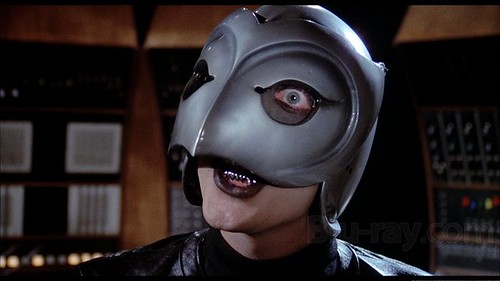REVIEW: ‘Phantom of the Paradise’ is the horror rock musical you need now
The cult classic blends the aesthetics of horror and 70s rock

Winslow Leach (William Finley) dawns his disguise as the titular “Phantom of the Paradise”. “Phantom of the Paradise” by Pink Cow Photography is licensed under CC BY-NC 2.0.
October 8, 2020
With Halloween quickly approaching, why not spend that time recommending some horror films to get everyone in the mood for the spooky season?
For two genres that seem like complete opposites, horror and musicals have from time to time found a pairing with each other. “Little Shop of Horrors” and “Sweeny Todd” come to mind right away. So what happens when these two genres blend, but you also throw in a little bit of camp and 70s rock? You get something like “Phantom of the Paradise.”
Story continues below video.
As stated by the open narration from “The Twilight Zone” host Rod Serling, music producer Swan, played by Paul Williams, is looking for a new sound for his new concert hall, The Paradise. He hears the music of Winslow Leach, played by William Finley, and decides to steal his work without giving him any sort of credit. Due to certain circumstances, Winslow is left disfigured and dawns a disguise of a masked figure who haunts The Paradise, hoping to get revenge on Swan.
It’s hard to categorize “Phantom of the Paradise” under just one genre. The film is obviously influenced by the roots of horror with how it draws inspiration from “The Phantom of the Opera” and the story of Faust. But it also has many elements of comedic parody with how it takes a very over the top approach to satirize the music industry. Then there’s the musical numbers. This is what makes “Phantom of the Paradise” so special: it doesn’t follow any sort of genre rules.
The film starts with a 50s style doo-wop song performed by the fictional band The Juicy Fruits. This opening scene encapsulates a lot of the film, tonally and narratively. The opening narration of the film gives off a feeling of horror not only with its unsettling mood, but using the voice of someone like Serling who is known for works that blend sci-fi and horror. So we’re kind of taken aback by seeing a band similar to The Four Seasons. It’s very similar to the kind of tonal whiplash the film has.
At one moment, we can watch Phoenix, played by Jessica Harper, sing an emotional number in front of a large crowd that immediately gives her the popularity she always wanted. At another moment, Winslow gets his head smashed by a record making machine and turns into the titular Phantom of The Paradise. The energy of this film is chaotic, but in the best possible way.
The horror of the film doesn’t come from any sort of actual terror, but from the aesthetic choices, whether visually or narratively. The story draws heavily from the classic story of “The Phantom of the Opera.” The gothic horror aesthetic of that story is replaced by over the top camp here, which is an aesthetic that finds enjoyment out of what the mainstream wouldn’t deem acceptable, and bases a lot of it off of excess. The disguise that Winslow dawns later in the film feels like the perfect costume for a Halloween party. More Winslows, less Deadpools. Though the film, as it continues, introduces more elements of horror like pacts with the devil or even full-on homages to classic horror. The film makes distinct references to “Psycho” and “The Cabinet of Dr. Caligari.” While the film never tries to overtly be scary, the horror genre is just as important to the plot as the musical genre.
There’s something still so relevant to the way this film not only satirizes the music industry, but also attacks it. Winslow never gets the credit he deserves for his work. Swan cares only about his music and not his performance, he would rather have a more profitable image. Winslow has to make a literal blood pact with Swan to get his music played how he wants it. Here, the legal practices and contracts for fame and money involve signatures in blood and pacts with the devil.
There’s an underlying evil to capitalist practices in the music industry — though, who’s surprised by that? The film even kind of predicts the use of digital trickery and autotune in music when Swan has to make a device to help Winslow speak and sing. Underneath the camp and horror of the film, is an indictment of the music industry that still rings a little true.
Story continues below video.
Director Brian De Palma throws every sense of style into every frame of this film, though this comment does come with some bias as De Palma is one of my all-time favorite directors. He isn’t afraid to get a strange close-up or use a wide angle lens to capture the strange environment of record label offices. His signature split screen effect is used so effectively in capturing the different angles of a performance practice as Winslow plants a bomb, Swan watches from afar and the female models are only cared about for their sex appeal. De Palma’s Hitchcock influence is brought into full effect in a scene that comedically recreates the shower scene from “Psycho.”
“Phantom of the Paradise” isn’t a musical in a traditional sense. Don’t expect big show-stopping numbers. Music is used as a backdrop for the film. The song “Faust” that Winslow writes plays a huge role in the whole story of the film. Many of the songs are performed as they would be for a concert. The song Beef sings, “Life at Last,” is a full-on stage performance. Many of the songs work as most performances in musicals do, reflecting the emotions and turmoil of the characters, but work as standalone songs.
No other film has the kind of energy that “Phantom of the Paradise” has. It’s crazed aesthetic of horror and rock could have only happened in the 70s. It feels not only against the establishment in its criticism of the music industry, but in how it feels like its own thing. Imagine a major studio making something this bonkers, it probably wouldn’t happen. Bless this film for existing.
Oh and for some more De Palma for the Halloween season, might I also suggest “Carrie” and “Sisters”?
“Phantom of the Paradise” is available to rent or buy on Amazon, Apple TV and YouTube.



































































































































